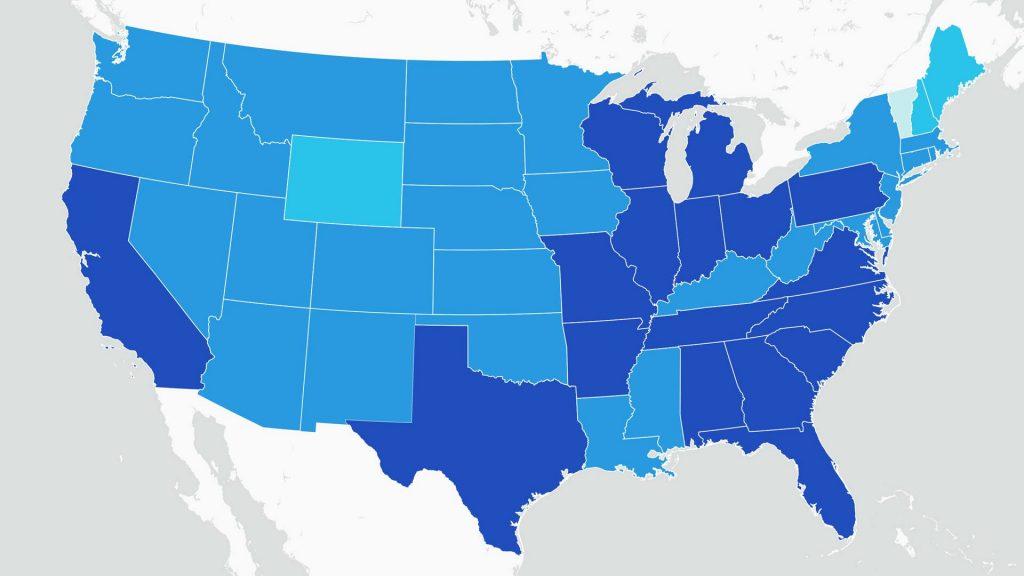ROCHESTER, Minn. — The number of COVID-19 cases is surging in some regions nationally and retreating in others, making reliable information and personalized guidance on the pandemic more important than ever.

To help people protect themselves and their loved ones, Mayo Clinic has introduced a tracking tool on MayoClinic.org that features the latest COVID-19 data for every county in all 50 states and Washington, D.C., and Mayo Clinic insight on how to assess risk and plan accordingly.
"U.S. Coronavirus Map: What Do the Trends Mean for You?" is an interactive map on Mayo Clinic's COVID-19 online resource center. This map presents key data and trends in an easy-to-use format. Data include the total number of cases by county and state, new cases per day, positive test rate and fatality rate, presented with trends over time and Mayo Clinic guidance on how to take action.
Mayo Clinic has been a national leader in responding to the COVID-19 pandemic. In March, Mayo announced an early test to detect COVID-19 infection, and Mayo Clinic Laboratories has been a national leader in COVID-19 testing, processing over 1.4 million tests. In April, the Food and Drug Administration named Mayo Clinic the lead institution to coordinate access to convalescent plasma for patients with severe or life-threatening cases of COVID-19. Throughout the pandemic, Mayo researchers and experts have provided expertise to guide the public health response, and clinical staff have been on the front lines providing lifesaving care for patients with COVID-19.
"COVID-19 infections continue to rise and fall in many areas of the country, and information at the local level on the prevalence of disease and future trends are more important than ever to help people prevent the spread of infection," says Henry Ting, M.D., a cardiologist, health services researcher and educator at Mayo Clinic. "This interactive map, enriched with Mayo Clinic expertise, is designed to be easy to use, with the most current data available and correlated with the latest Mayo Clinic guidance."
Watch: Dr. Henry Ting discusses the Mayo Clinic COVID-19 Tracking tool.
Journalists: Broadcast-quality b-roll of the Coronavirus Map and sound bites with Dr. Ting are available at the end of this post. Please courtesy, "Henry Ting, M.D. / Cardiovascular Disease / Mayo Clinic" and "Mayo Clinic News Network."
Dr. Ting, who is Mayo Clinic's chief value officer, worked with a team of Mayo Clinic data scientists to develop content sources, validate information and correlate expertise for the tracker ― all of which will be enhanced with more real-time data and predictive modeling.
"From our experience in treating patients and talking with them about their concerns, we believe there's a need for easy-to-access local data on COVID-19 trends and what it means," Dr. Ting says. "This tracker enables people to see ongoing and emerging hot spots across the U.S. ― where they live, where their family and friends live, and where they might travel, along with information from Mayo Clinic experts about risk, diagnoses and treatments."
Mayo Clinic's COVID-19 resource center provides guidance on how to wear a mask properly, maintain social distancing, wash hands frequently, and clean and disinfect surfaces. It also includes a self-assessment tool for users to determine whether they have symptoms and should seek medical care, and information for COVID-19 survivors on how to donate plasma to help others.
Nilay Shah, Ph.D., chair of the Mayo Clinic Division of Healthcare Policy and Research; John Poe, chair of the Department of Quality and Affordability; and Dr. Ting were appointed COVID-19 data governors for Mayo at the beginning of the pandemic. They have led a team of scientists and clinicians, including experts in infectious diseases, epidemiology, predictive modeling and artificial intelligence to develop projects such as the COVID-19 tracking tool.
"Much remains to be learned about the COVID-19 virus and how it affects a person's health in the short term and longer term," says Dr. Ting. "It's vital that people become more aware of local information, what the trends are, and take appropriate action to protect their health and the health of others."
###
About Mayo Clinic
Mayo Clinic is a nonprofit organization committed to innovation in clinical practice, education and research, and providing compassion, expertise and answers to everyone who needs healing. Visit the Mayo Clinic News Network for additional Mayo Clinic news and Mayo Clinic Facts for more information about Mayo.
Media contact:
- Jay Furst, Mayo Clinic Public Affairs, newsbureau@mayo.edu







